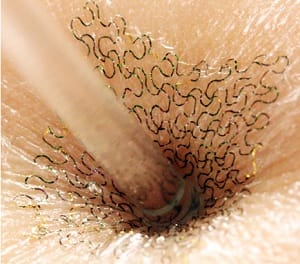Electronic skin could enable 'smart' prosthetics

 The concept of electronic skin might sound far-fetched, but it’s closer to becoming a reality with a wide range of potential uses.
The concept of electronic skin might sound far-fetched, but it’s closer to becoming a reality with a wide range of potential uses.
So-called smart gloves, for example, could allow medical students to practice virtual surgery that felt like the real thing. Flexible material embedded with circuitry could also be fitted around internal organs to enable doctors to monitor temperature and blood flow, or help burn victims and amputees regain sensation on injured parts of their bodies.
A team of researchers from the University of Illinois, Urbana-Champaign, Northwestern University, and China’s Dalian University of Technology has developed what could be a precursor to such devices by implanting circuits into stretchable polymer that’s attached onto the inside of a wearable silicone fingertip. By pressing objects while wearing the “electronic finger,” the scientists created electric currents that generated a tingling sensation on their fingertips.
Eventually, such circuitry could be used to create electrical signals that reproduce a variety of different sensations, from touch to heat to texture.




